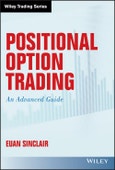A detailed, one-stop guide for experienced options traders
Positional Option Trading: An Advanced Guide is a rigorous, professional-level guide on sophisticated techniques from professional trader and quantitative analyst Euan Sinclair. The author has over two decades of high-level option trading experience. He has written this book specifically for professional options traders who have outgrown more basic trading techniques and are searching for in-depth information suitable for advanced trading.
Custom-tailored to respond to the volatile option trading environment, this expert guide stresses the importance of finding a valid edge in situations where risk is usually overwhelmed by uncertainty and unknowability. Using examples of edges such as the volatility premium, term-structure premia and earnings effects, the author shows how to find valid trading ideas and details the decision process for choosing an option structure that best exploits the advantage.
Advanced topics include a quantitative approach for directionally trading options, the robustness of the Black Scholes Merton model, trade sizing for option portfolios, robust risk management and more. This book:
- Provides advanced trading techniques for experienced professional traders
- Addresses the need for in-depth, quantitative information that more general, intro-level options trading books do not provide
- Helps readers to master their craft and improve their performance
- Includes advanced risk management methods in option trading
No matter the market conditions, Positional Option Trading: An Advanced Guide is an important resource for any professional or advanced options trader.
Table of Contents
Introduction xi
Trading as a Process xiii
Summary xv
Chapter 1 Options: A Summary 1
Option Pricing Models 1
Option Trading Theory 4
Conclusion 10
Summary 10
Chapter 2 The Efficient Market Hypothesis and Its Limitations 11
The Efficient Market Hypothesis 11
Aside: Alpha Decay 15
Behavioral Finance 16
High-Level Approaches: Technical Analysis and Fundamental Analysis 21
Conclusion 27
Summary 27
Chapter 3 Forecasting Volatility 29
Model-Driven Forecasting and Situational Forecasting 30
The GARCH Family and Trading 33
Implied Volatility as a Predictor 36
Ensemble Predictions 36
Conclusion 38
Summary 38
Chapter 4 The Variance Premium 39
Aside: The Implied Variance Premium 40
Variance Premium in Equity Indices 42
The Implied Skewness Premium 46
The Implied Correlation Premium 47
Commodities 47
Bonds 49
The VIX 50
Currencies 50
Equities 50
Reasons for the Variance Premium 51
Insurance 52
Jump Risk 52
Trading Restrictions 52
Market-Maker Inventory Risk 52
Path Dependency of Returns 53
The Problem of the Peso Problem 55
Conclusion 56
Summary 56
Chapter 5 Finding Trades with Positive Expected Value 57
Aside: Crowding 57
Trading Strategies 61
Options and Fundamental Factors 63
Post-Earnings Announcement Drift (PEAD) 68
Confidence Level Two 71
The Overnight Effect 75
FOMC and Volatility 75
The Weekend Effect 77
Volatility of Volatility Risk Premia 78
Confidence Level One 80
Earnings-Induced Reversals 80
Pre-Earnings Announcement Drift 81
Conclusion 82
Summary 83
Chapter 6 Volatility Positions 85
Aside: Adjustment and Position ‘‘Repair’’ 86
Straddles and Strangles 86
Aside: Delta-Hedged Positions 93
Butterflies and Condors 95
Aside: Broken Wing Butterflies and Condors 99
Calendar Spread 100
Including Implied Volatility Skew 102
Strike Choice 104
Choosing a Hedging Strike 107
Expiration Choice 109
Conclusion 111
Summary 111
Chapter 7 Directional Option Trading 113
Subjective Option Pricing 113
A Theory of Subjective Option Pricing 115
Distribution of Option Returns: Summary Statistics 118
Strike Choice 120
Fundamental Considerations 124
Conclusion 124
Summary 125
Chapter 8 Directional Option Strategy Selection 127
Long Stock 128
Long Call 129
Long Call Spread 130
Short Put 131
Covered Calls 131
Components of Covered Call Profits 134
Covered Calls and Fundamentals 136
Short Put Spread 137
Risk Reversal 138
Aside: The Risk Reversal as a Skew Trade 141
Ratio Spreads 142
Conclusion 145
Summary 145
Chapter 9 Trade Sizing 147
The Kelly Criterion 147
Non-normal Discrete Outcomes 149
Non-normal Continuous Outcomes 151
Uncertain Parameters 154
Kelly and Drawdown Control 158
The Effect of Stops 161
Conclusion 170
Summary 170
Chapter 10 Meta Risks 171
Currency Risk 171
Theft and Fraud 173
Example One: Baring’s Bank 174
Example Two: Yasumo Hamanaka, aka ‘‘Mr. Copper’’ 175
Example Three: Bernie Madoff 176
Index Restructuring 177
Arbitrage Counterparty Risk 178
Conclusion 179
Summary 179
Conclusion 181
Appendix 1 Traders’ Adjustments to the BSM Assumptions 183
The Existence of a Single, Constant Interest Rate 183
The Stock Pays No Dividends 186
Absence of Taxes 186
The Ability to Trade and Short the Underlying 187
Nonconstant Volatility 190
Conclusion 192
Summary 193
Appendix 2 Statistical Rules of Thumb 195
Converting Range Estimates to Option Pricing Inputs 195
Rule of Five 196
Rule of Three 197
Appendix 3 Execution 199
Example 204
References 207
Index 219








